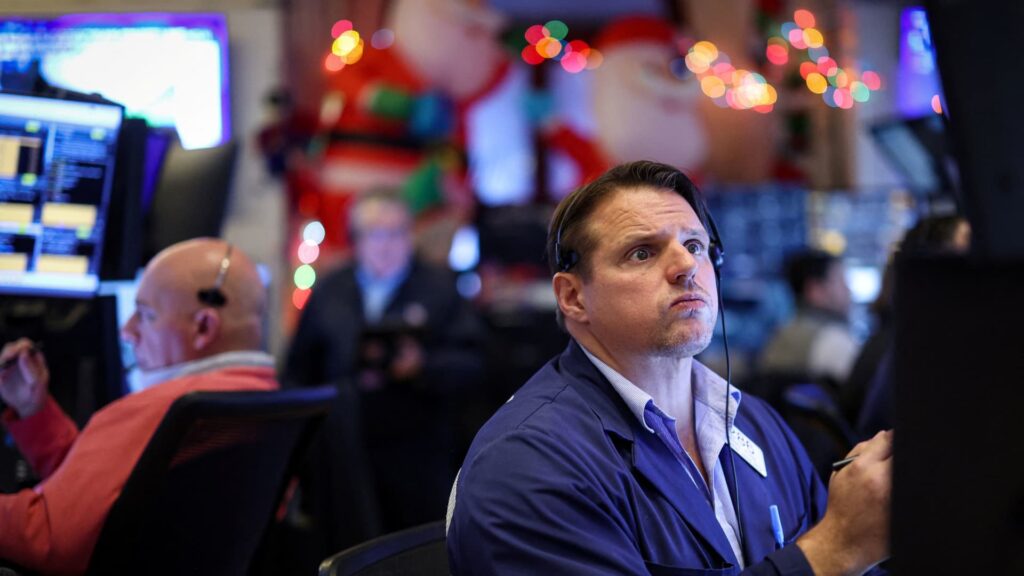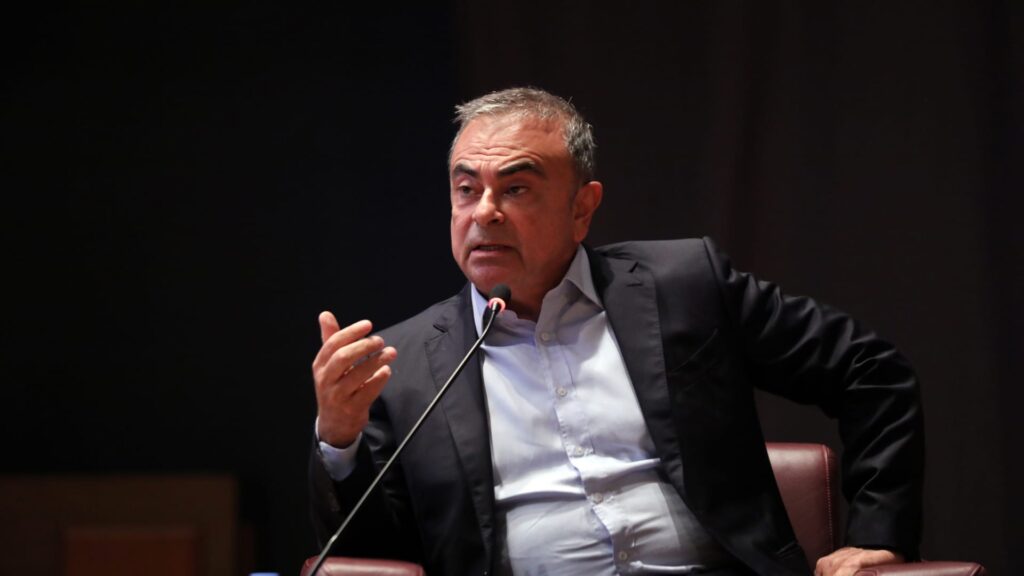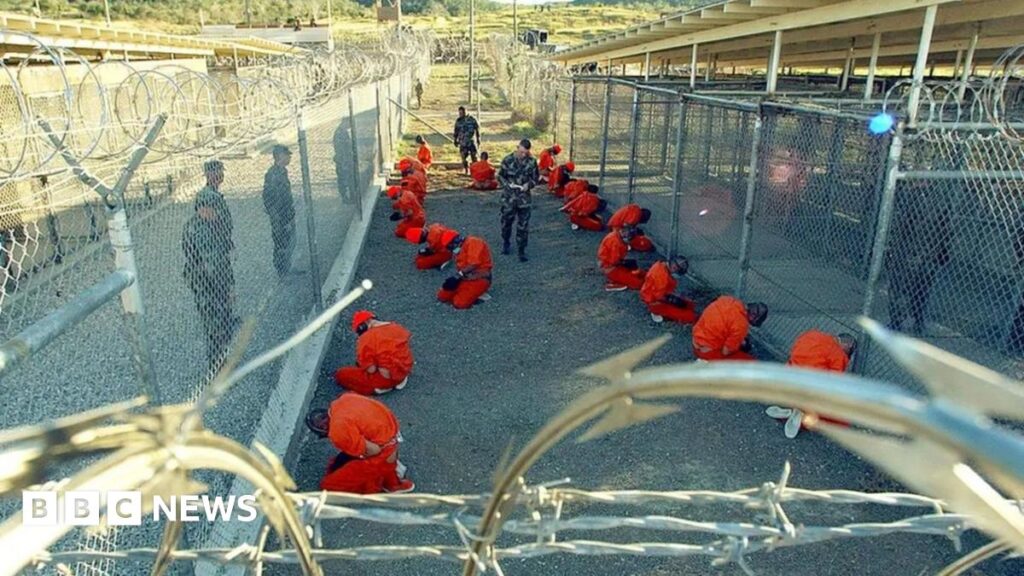]
Buenos Aires, Argentina – Late last month, Argentinian President Javier Milei uploaded a characteristically odd photo on social media. It showed him posing with his cabinet behind a golden chainsaw – a callback to the campaign prop Milei wielded at rallies to punctuate his support for spending cuts. An accompanying caption read: “The best government in history.”
That bravado may still prove premature but, for now, Milei’s supporters say he has delivered on at least some of his promises – even if many Argentinians are suffering the consequences.
In his first year of his presidency, Milei’s commitment to a draconian fiscal adjustment has begun to change a country that was prone to economic stagnation and runaway inflation, driven by years of wild money-printing that paid for government deficits.
A self-described anarcho-capitalist, Milei revved-up his chainsaw immediately upon taking office, quickly moving to slash spending, eliminate government ministries and fire hundreds of bureaucrats.
In tandem, pensions and public salaries were held down, cutting their real value, and public infrastructure projects were scrapped.
The cost-cutting resulted in a fiscal surplus in Milei’s first full month in office back in January, and in every month since, a nearly unprecedented streak in recent Argentinian history. Overall, Milei has reduced government spending by 30 percent relative to last year.
The president’s contempt for the administrative state has been winning Milei influential admirers outside of Argentina, especially among United States President-elect Donald Trump’s ascendant circle. The victor of last month’s US election has repeatedly praised Milei, calling him his “favourite president”.
Both Elon Musk and Vivek Ramaswamy, the Trump acolytes tasked with downsizing the US federal government, have spoken well of Milei’s austerity measures, with Ramaswamy advocating for “Milei-style cuts, on steroids”.
EL MEJOR GOBIERNO DE LA HISTORIA
VIVA LA LIBERTAD CARAJO pic.twitter.com/HK4cGCk8dl— Javier Milei (@JMilei) November 28, 2024
Domestically, Milei’s reforms have produced the holy grail of Argentinian politics: falling inflation.
When Milei was elected in 2023, Argentina had the world’s highest annual inflation rate in the world: 211 percent. Prices were rising month-on-month by 13 percent, spiking to 25 percent in December 2023 – after Milei became president – following a huge currency devaluation by his government. But monthly inflation is now at 2.4 percent, according to data for November, the lowest in more than four years.
“Inflation was the big phenomenon that voters really cared about,” said Federico Robles, programme coordinator of the Wilson Center’s Latin America programme in Washington, DC. “This is a government that came in and said they were going to solve inflation, and no other issue was going to matter as much as that.”
Another positive indicator: Argentina’s central bank has started bringing in billions in new foreign currency reserves, thanks in part to a tightened monetary regime and a tax amnesty scheme that incentivised Argentinians to bring dollar savings back into the banking system.
Still, despite the recent influx, overall reserves remain in the red.
The country’s renewed macroeconomic stability is changing Argentina’s perception in the markets. The country-risk index, an influential measure of the risk of default from JP Morgan, has tumbled from about 2,000 when Milei took office to roughly 750 at the beginning of the month, its lowest level in five years.
Impact on the poor
To be sure, the belt-tightening that restored order to Argentina’s accounts has come at a steep social cost, triggering a punishing recession, an increase in unemployment and a fall in real wages across both the public and private sectors.
The brunt of the pain has fallen on the working class. Poverty surged to 53 percent in the first half of 2024, up from 40 percent in 2023 – the highest recorded jump in two decades. It has since dipped slightly to 50 percent, although the number of people estimated to be living in extreme poverty remains north of 6 million.
Nearly seven in 10 Argentinian children are growing up poor, up slightly compared with 2023, according to UNICEF. And 1 million boys and girls go to bed every day on an empty stomach.
“Nothing about the current disinflationary dynamic has much bearing on the quality of life of families or the purchasing power of workers”, said Sergio Chouza, the economist behind local consultancy Sarandi, on his economy-centred TikTok account.
Demand at food distribution centres and soup kitchens has surged across the country. Meanwhile, working-class Argentinians’ pocketbooks have been further battered by the elimination of energy and public transportation subsidies, which has led to ballooning bills.
There are some signs that the most painful phase of the Milei adjustment may be over: Consumer spending and manufacturing are showing gains. In September, wage growth outpaced inflation for the sixth consecutive month. Overall, it is estimated that this year’s recession will give way to a 5 percent economic expansion in 2025, according to the World Bank.
“This is Argentina. The country is still in a tough situation. But you have to understand what the baseline was”, said Juan Ignacio Carranza, from Aurora Macro Strategies. The economic crisis inherited by Milei “was like a bomb waiting to explode”.
“Economic activity and purchasing power from citizens haven’t improved yet… It’s still a very fragile situation”, Carranza said. “But now we at least have a path [forward].”
Expectation management
At the time of his inauguration a year ago, Milei’s odds of success appeared slim at best.
The challenges facing the country were pressing, and the incoming president’s shortcomings plentiful. A hotheaded political outsider who gained national prominence through bombastic TV appearances, Milei had no track record of guiding policy proposals through the legislative process.
Some experts raised concerns of an era of dysfunction under Milei akin to Argentina’s traumatic economic and political meltdown in the early 2000s, when the country shuffled through five presidents in the course of two weeks.
“Many, many analysts predicted a catastrophic end to his government at the beginning of the year,” Robles said.
Milei avoided that fate in part because his supporters have largely stood by him through the pinch of austerity politics. Notably, Milei’s approval ratings remained relatively stable throughout his first year in office – a feat that eluded his three predecessors on the job, although they initially posted higher approval peaks. According to pollster Poliarquia, Milei concluded his first year as president with 56 percent approval, up from 52 percent a month prior.
Robles credits Milei’s efforts to expectation management. In his very first speech as president, and throughout his campaign, Milei did not downplay the short-term pain of his economic reforms, noting the country’s situation would get worse before it got better.
“We are used to hearing presidential candidates making optimistic promises of prosperity and talk about a future that’s paradisiacal,” Robles said. Instead, what Milei told voters was that “first, we would have to go through hell”.
Milei has been able to push through his policies despite his party having only a small minority of federal lawmakers – and zero provincial governors countrywide. The passing of a signature legislative package earlier this year aiming to boost growth and raise revenue required political pragmatism, with Milei backing a watered-down version of the original bill to get support from other parties.
“How he is managing the political situation has been the most surprising thing for all of us,” Carranza said. “Being in a really weak position with no support in Congress… I think that’s been his main achievement.”
But Milei’s economic achievements in his first year are not necessarily indicative of future growth.
“The end result in terms of productivity, consumer spending, investments, that all comes from how the private sector reacts to the new political economy,” said Camilo Tiscornia, an economist and the director of the Argentinian consultancy C&T Asesores Economicos. “In other words, the government can’t decide when the economy will grow.”
To help spur growth, the Milei administration has begun bulldozing the regulatory maze that has long made doing business in Argentina difficult. But Tiscornia said the “most important deregulatory step” is still pending, referring to the capital controls it inherited, a big red flag for investors worried about being able to take money out of Argentina if needed.
The government has also not freed up the exchange rate.
An increasingly overvalued peso is complicating efforts to attract capital and is putting downward pressure on exports. It is a status quo that makes it more difficult for the central bank to accumulate dollar reserves, a crucial resource for paying off foreign debts.
According to Chouza, this is a recipe for “a very severe crisis”. In his view, the current strength of the peso is the product of technical machinations under Milei, including his extension of capital controls, and does not reflect the real state of the Argentinian economy. It will not be sustainable in the medium to long term.
Depreciating the peso would help address some of those issues, but it would likely trigger another bout of inflation, eroding Milei’s main accomplishment in his first year.
“Every economic indicator got worse, except for inflation”, said Chouza in a video recap of Milei’s first year. “The question is: Is it worth it to register a decrease in [gross domestic product] GDP, industrial production, employment, purchasing power, real wages, international currency reserves only to reduce inflation … I think it’s not worth it.”
“I don’t believe there is much to celebrate, even though Javier Milei, incredibly, says this is the best government in history. Let’s see what happens in Milei’s second year”.








